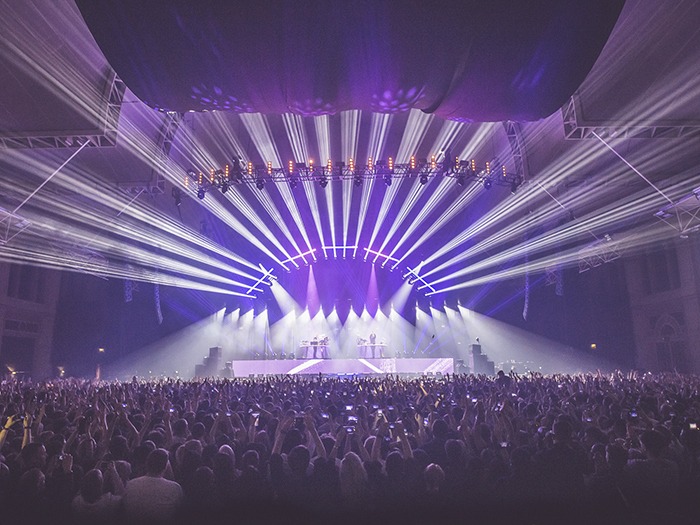Roy Hunt and Paul McAuley of PRG XL Video have been taking care of British music duo Disclosure’s technological needs as they continue their biggest tour to date.
Show and Lighting Designer Will Potts organised a demo with co-designers Okulus (James Scott and Louis Oliver) in summer 2015, during which they tested the beta version of Vanish screen against similar products alongside the Robe BMFL, Aytron Magic Blade and some profile lights to select which high-transparency LED screen he’d like to use on the upcoming Disclosure shows.
Behind the upstage 22.8 metres by six metres Vanish screen sat two trusses, fitted out with 32 PRG Best Boy HP spots and 32 Martin by Harman Atomic strobes to blow through the screen.
Although the Vanish screen was the main feature of the video design for the show, there was plenty more LED on and around the stage. Two six metres by 3.6 metres ROE MC-18 side screens displayed image magnification, with footage being provided by four Sony HXC-100 cameras. Curved around the riser from where Howard and Guy were performing was 7.2 metres by 1.2 metres strips of ROE MC-7; above the performance area was a further strip of ROE MC-7 LED screen, referred to as the Venetian, which pivoted down into view at certain points during the show. All video content was run through two d3 Technologies 4x4pro media servers – specified and programmed by Icarus Wilson-Wright.
Discussing other elements of the design, Potts explained: “Mid-stage we have the Mythos trusses, which are basically a long truss split into five independent and automated sections which are choreographed tightly with the video through the show. I’ve always wanted to work some automation into the Disclosure show and for the summer festivals we managed to use three moving trusses, now we’re in arenas, it’s five.” Each section of the truss is loaded with four Clay Paky Mythos moving lights and seven Philips Nitro 510C LED strobes.
Potts programmed the show with James Scott and runs it from a MA Lighting grandMA2 lighting console. When asked about the merits of using timecode over manually operating a live show, Potts said: “With the new Disclosure show, running things live and hands on was never a viable option as there are just too many cues for one set of hands. The boys on stage, as well as the rest of the visual crew need this consistency on these big shows so they can concentrate on their parts – especially with screens, trusses and hydraulic lifts moving around.
“The whole show is programmed to timecode which makes running the show very simple, allowing me to oversee and tweak as necessary. There is one song I operate manually, which is during a section in the show where the boys go off on a tangent away from the set list. It’s nice to manually operate once in a while.”
Potts concluded: “Physically touring the show is part of developing the design, it’s here we learn what does and doesn’t work both visually, musically and technically so you have to be there and be part of it initially. I wouldn’t tour for the length of every campaign, but with these guys it’s a pleasure to be part of each show.”


